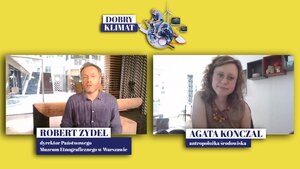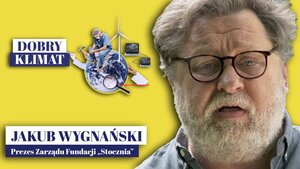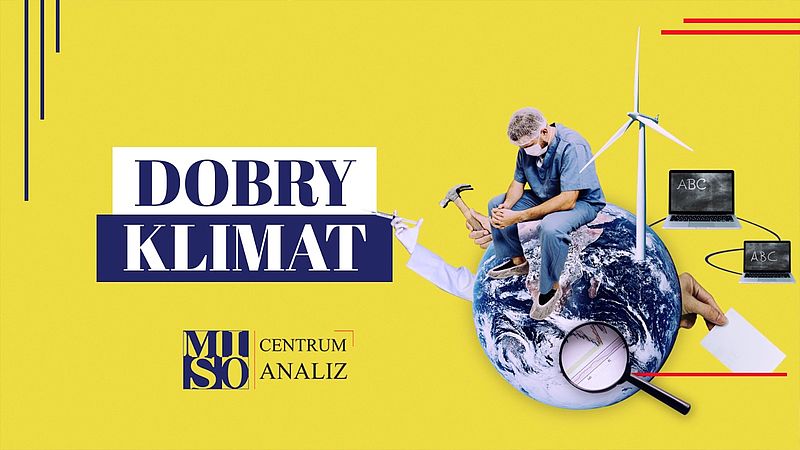Speakers’ Corner – Good Climate
The "Good Climate" area included a talk by Agata Konczal and Robert Zydel entitled Forests and People. Then we could listen to Jakub Wygnański’s speech titled Clean Air for Everyone.
At the beginning Agata Konczal, environmental anthropologist, noted that the forest played an important role in many cultures. In her book "Anthropology of the Forest. Foresters and the Perception and Formation of Images of Nature in Poland," she writes not only about forests as an element of the natural world, but also about how we manage and think about the forest. The perception of the forest is changing around the world, Poland to include.
We need to distinguish between a natural forest and a wild forest. The essential feature of a natural forest is the presence of the man and the work of that man. It can even be said that the man is a natural element of the forest and his work is needed to maintain the forest in a decent shape. A wild forest is exactly the opposite of a natural forest. It is a forest without human presence. It is also beyond our scientific understanding. By shaping the natural forest the foresters seek to contain the wild forest. Both foresters and naturalists use the category of a "natural forest," but they understand the concept quite differently. It can be said that they want to get a different forest as a result of their activities.
Robert Zydel, director of the State Ethnographic Museum in Warsaw, noted that it was becoming increasingly difficult for us to get a wild forest. The forests to which we moved in crowds during the pandemic looked more like big farms, and many people lamented that, because they would like to be in the midst of something that was the opposite of the culture surrounding us.
According to Agata Konczal, the fact that we, the humans, think of ourselves as something external to nature, limits our perception of nature and our being in nature. Nature creates us and we create nature, we are in constant relationship.
Konczal noted that in her work at the European Forest Institute (EFI), where he works, young researchers are looking into spiritual services of the forest ecosystem, for example. This is a topic that is slowly making its way into our lives. In Poland, there has been recently published a book on forest bathing and on how we can heal ourselves by staying in the wood. In addition, the concept of forest cemeteries is gaining more and more attention in a lot of European countries. People don't want to be buried in metropolises, in cities, but they want their remains to be laid to rest in forests. All this shows how the perception of the forest is changing.
Finally, it is worth mentioning that modern anthropology is beginning to deal with other entities, animals, plants, but also landscape.
Robert Zydel expressed his hope that anthropologists would be seen as people who wanted to combine culture and nature. As director of the State Ethnographic Museum in Warsaw, he introduced a rule that exhibitions could be visited in the company of dogs, cats, because he wanted to build cross-species alliances.
We invite you to watch Agata Konczal’s and Robert Zydel's debate titled Forests and People.

_ _ _ _ _
Energy poverty affects between 4 and 6 million people in Poland. It is a problem in which a great many issues come together - demographics, poverty, technology, climate change, big business politics.
To talk about energy poverty, two conditions must be met - limited income and high energy costs. This is not a specifically Polish phenomenon, it occurs all over the world.
It is not only in Poland that we have reached a point where the challenges we face require new social agreements, effort, and reflection. According to Jakub Wygnański, an agreement must be reached between very parties.
- First, we need to establish that this problem should be addressed right now and all our energies should focus on it. Second, the conversation on this issue should not only take place in large and small cities, but also in local communities. Third, we have to adopt a model that is popular in the world, that is, conclusions and opinions are to be formulated by a group of randomly selected citizens. Finally, we need to reach out to politicians and ask them a hard question - what are they going to do about it? - Jakub Wygnański said.
Starting from education and discussions the cycle should end with a formulation of a kind of agreement and social preference. Finally, political implementation. Because the consequences of energy poverty are serious, we all will pay for these deficits sooner or later.
We invite you to familiarize with Jakub Wygnański's article titled Clean Air for Everyone.

_ _ _ _ _
Agata Konczal - environmental anthropologist working on forest management and political ecology. She researches the diversity of forest perception and its socio-political implications. Her work focuses on forest management, hunting, ecology and nature conservation. She is interested in the idea of "wilderness" and the concept of "rewilding." She is a researcher at the European Forest Institute (EFI).
Robert Zydel - director of the State Ethnographic Museum in Warsaw. Graduate of the Institute of Ethnology and Cultural Anthropology at the Warsaw University. For many years he conducted laboratories and classes related to the practical application of ethnographic tools in marketing research. He is a board member of the Polish Society for Opinion and Marketing Research.
Jakub Wygnański - sociologist, graduate of Warsaw University, scholarship holder at Yale University. Researcher of civil society, volunteerism and philanthropy in Poland. Founder and currently President of the Board of STOCZNIA Research and Social Innovation Studio. Co-founder of the Civic Fund.


